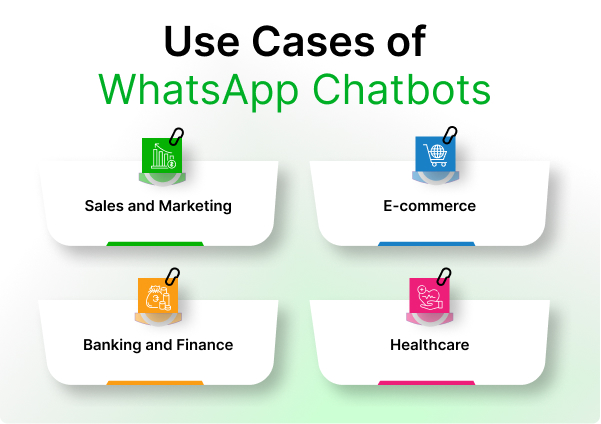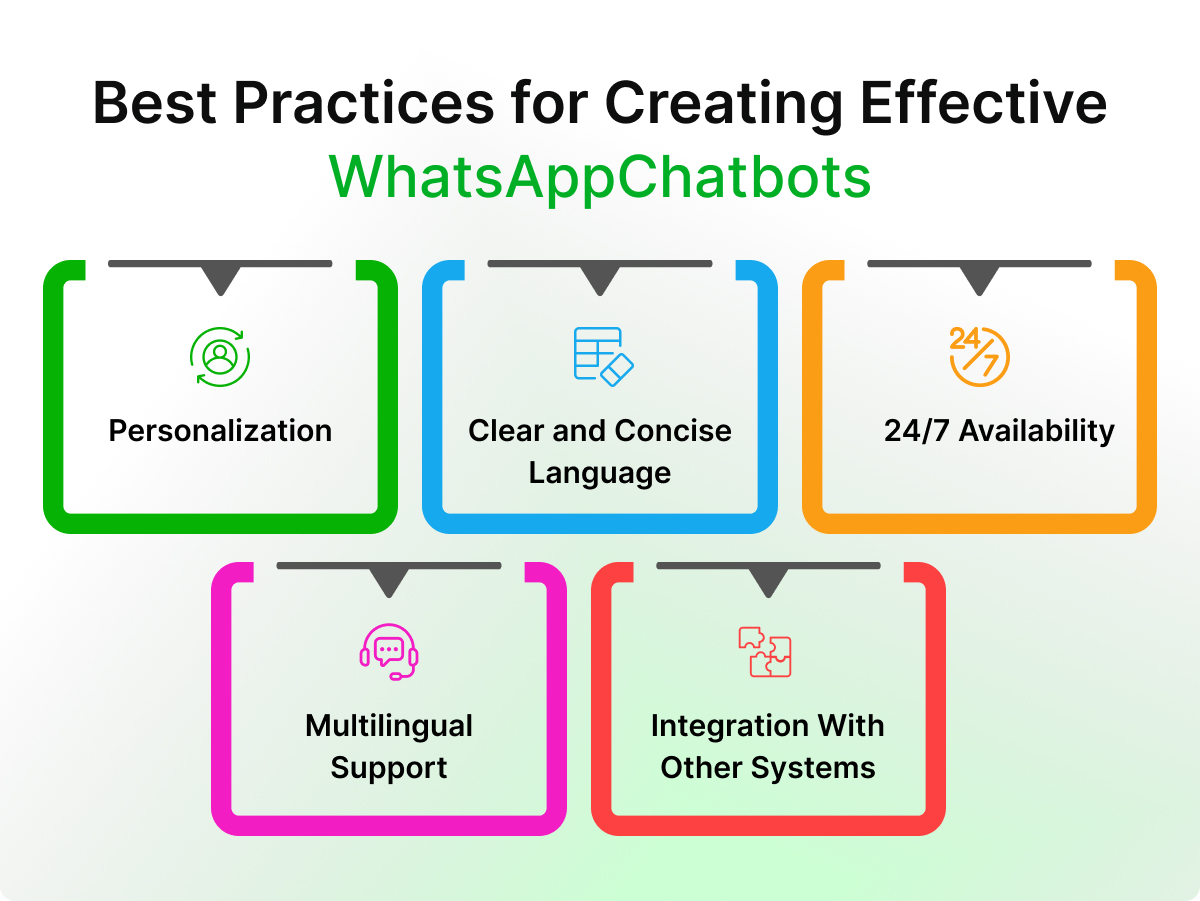 Chatbot
Chatbot

23 April, 2023

In a world where technology has made it easier to access goods and services than ever before, there remains a gap in customer communication that requires sincere attention. But fear not, for there is a solution that will bridge this gap once and for all: the WhatsApp chatbot.
With this innovative technology, businesses can provide their customers with the support and attention they deserve. By leveraging the power of artificial intelligence, it can handle a wide range of customer queries, from simple requests to more complex issues, all while maintaining the human touch that customers crave.
So if you want to take your business to the next level, keep reading to be smart in keeping people surrounding you.
Contents
A WhatsApp chatbot can be thought of as a personal assistant who is always available to answer your questions or help you with tasks, but instead of speaking to a human assistant, you communicate with a computer program through a messaging app like WhatsApp.
Think of it like having a virtual butler who you can chat with through your phone. Just like a real butler, the chatbot can help you with a variety of tasks, such as booking appointments, finding information, or even placing orders. But instead of calling out to your butler, you simply type your requests into the WhatsApp chat window.
If you wander about a WhatsApp chatbot example, just imagine you’re planning a vacation and you want to book a hotel. With this software, you could simply send a message asking for hotel recommendations, and the bot would respond with a list of options based on your preferences and budget. You could then ask the bot to book your preferred hotel, and it would take care of the rest.
When you make up your mind to do the WhatsApp chatbot integration, it will offer a range of benefits for your business management. Here are some best advantages:

It can allow responding to customer inquiries quickly and efficiently. With a chatbot, custom
ers can receive instant answers to their questions, 24/7, without waiting for a human representative to become available. You will experience your company’s growth skyrocketing along with customer loyalty and satisfaction.
Its personalized recommendations and offers create a feeling of taking seriously among customers. Chatbots can analyze user data and provide tailored suggestions and promotions based on customers’ interests and preferences, helping to build stronger relationships with the audience.
If you think about your precious time, you will find it super speedy and handy. There are no more handling repetitive tasks and routine inquiries manually. This automation literally frees you up to focus on more complex issues, resulting in more efficiency.
Finally, this solution reduces the need for human customer service agents and provides more scalable customer service. Automation means you no longer have to worry about labor costs.
A powerful chatbot is not only automating your business operations but also accommodating your customers in the operations. Now you are going to get through a comprehensive guideline to do that.
To use WhatsApp Business API, you first need to create a WhatsApp Business account. You can do this by downloading the WhatsApp Business app from the Google Play Store or Apple App Store and creating an account. Once you’ve created an account, you can then apply for WhatsApp Business API access.
To apply for WhatsApp Business API access, you need to visit the WhatsApp Business API website and fill out the application form. You’ll need to provide information about your business, such as your name, address, and phone number, as well as information about your intended use of the API.
Once your application has been approved, you’ll need to set up your WhatsApp Business account for API access. This involves verifying your phone number and business information and setting up a webhook to receive incoming messages.
Next, you’ll need to choose a chatbot platform to build your chatbot. There are several chatbot platforms available, such as Dialogflow, Botpress, and ManyChat, among others. Choose a platform that suits your business needs and has WhatsApp Business API integration.
Once you’ve chosen a chatbot platform, it’s time to build your chatbot. This involves creating conversational flows, setting up responses to common queries, and programming your chatbot to understand natural language. Most chatbot platforms have drag-and-drop interfaces that make it easy to build your chatbot without any coding skills.
After building your chatbot, you need to integrate it with WhatsApp Business API. This involves setting up a webhook to receive incoming messages and configuring your chatbot to respond to messages received through the WhatsApp API. Your chatbot platform should have documentation on how to integrate with WhatsApp Business API.
Before launching your chatbot, it’s important to test it thoroughly to ensure that it works as expected. Test your chatbot by sending it various messages and ensuring that it responds correctly. You can also ask colleagues or friends to test your chatbot and provide feedback.
Once you’re satisfied that your best WhatsApp chatbot works as expected, it’s time to launch it. You can start promoting your chatbot to your customers and providing them with the necessary information to start using it.
If you look at its footprint in the business industry, you will be surprised by its scope in various sectors. Now, let’s discuss the most important use cases of this application:

This kind of bot can bring your lead generation and follow-ups on autopilot. For example, a chatbot can ask users about their preferences, interests, and requirements and provide relevant product recommendations. It can also send promotional offers and discounts to users to incentivize them to make a purchase.
Additionally, a chatbot can assist with lead generation by asking users for their contact details and automatically following up with them.
As this is not any human agent, it doesn’t have any problem staying available 24/7 to help customers with their orders, tracking information, and delivery details. Answering FAQs (frequently asked questions) about products and services can cause an immediate reduction in the workload of customer support agents.
Moreover, it can send recommendations and promotions to users by name based on their activity history, improving the likelihood of repeat business.
Everything gets quick and easy when it comes to accessing account information, like balance, transaction history, and payment due dates. Additionally, a chatbot can help customers with fund transfers, bill payments, and investment advice. It can also send alerts and notifications to customers about their account activity, helping them stay on top of their finances.
When you are thinking about information management, you will find it as a superhero. Assisting patients with booking appointments, providing medication reminders, and answering common health-related questions; all will go digital.
As a result, it can even triage patients based on their symptoms and provide them with relevant information and advice. Reduction of the workload of healthcare professionals and improving patient outcomes will naturally come in order.
Creating an effective WhatsApp chatbot for business requires careful planning and attention to detail. The following practices can give you a necessary jump-start:

To create a personalized experience, chatbots should be designed to gather user information, such as their name, location, and preferences. This can be done through simple questions or prompts, and the chatbot can then use this information to provide tailored recommendations and responses. Using the user’s name in responses can also create a more personalized feel.
Chatbots should use simple and straightforward language that is easy for users to understand. Avoid using complex jargon or technical terms that may confuse users. It’s important to keep responses concise and to the point, providing clear instructions and avoiding unnecessary information.
To ensure 24/7 availability, chatbots can be designed to provide automated responses to common queries and issues. It’s important to ensure that users are aware of the chatbot’s availability and how to access it at any time. Additionally, providing a fallback option to a live agent can be helpful for more complex issues.
To support users who speak different languages, chatbots should be designed to support multiple languages. This can be achieved by using translation tools or by creating different versions of the chatbot for different languages. It’s important to ensure that users can easily switch between languages and that the chatbot is able to provide accurate and relevant responses in each language.
To provide a seamless experience for users, chatbots should be integrated with other systems and platforms. For example, integrating with a CRM system can enable the chatbot to provide personalized recommendations and responses based on the user’s history and preferences.
Integration with payment systems can also enable users to make transactions directly through the chatbot, streamlining the customer journey.
The future of the WhatsApp chatbot service is incredibly exciting! As more and more businesses turn to message apps like WhatsApp to communicate with customers, chatbots will become an increasingly important part of the customer experience.
With advancements in AI and machine learning, chatbots will become more sophisticated and better able to understand and respond to user needs. You can get started with building a custom chatbot that will help you provide top-notch customer service.
So, if you’re a business owner or marketer looking to stay ahead of the curve, don’t wait – start exploring this amazing tool today!